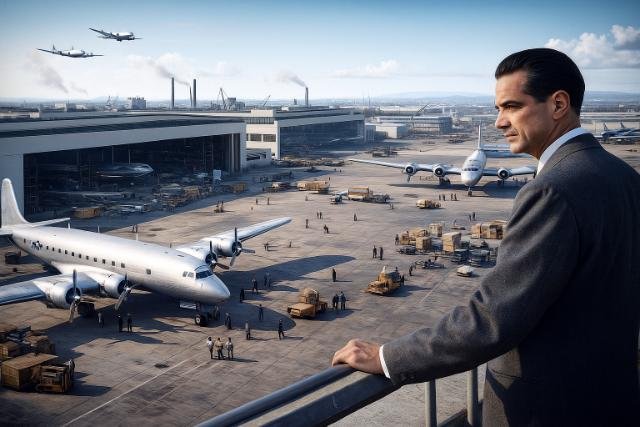Howard Hughes remains one of the most enigmatic figures in American history. His name often appears alongside discussions about aviation, film, engineering, and business leadership. Yet his financial legacy is equally compelling. Determining Howard Hughes net worth requires understanding the path of his business decisions, property holdings, innovations, and the unusual circumstances that surrounded his later life. This article provides a detailed and structured look at the financial trajectory that shaped his wealth, how it evolved over time, and what remains of it today.
Evaluate the Financial Foundation Built During His Early Career
Howard Hughes developed the core of his fortune during his early adulthood, and this foundation shaped the trajectory of his later achievements. His earliest wealth began with an inheritance, but he multiplied it through strategic investments that positioned him as a powerful industrial and entertainment figure. Understanding this starting point clarifies how he grew into one of the richest individuals of his era.
His early financial success depended heavily on identifying opportunities within film and aviation. As he gained control over the companies connected to his name, he reinvested profits and expanded into new ventures. These early moves created the momentum that allowed him to build a vast empire spanning manufacturing, entertainment, and aeronautics.
These foundational investments had long-term implications for the expansion of his wealth. Each project he took on became a stepping stone to larger financial decisions, allowing him to leverage his increasing visibility, power, and business influence.
Review Early Film Industry Contributions
Hughes gained national attention through his participation in Hollywood. He financed ambitious movies, invested heavily in production technologies, and pushed boundaries that reshaped filmmaking. His film projects required significant capital, but they also returned substantial financial rewards when they succeeded, establishing him as both a creative and financial powerhouse.
Assess the Initial Aviation Ventures
He began investing in aviation at a time when few others saw its potential. His investments in aircraft design and aviation engineering translated not only into world records and technological advancements but also into financial gains. These early ventures attracted government attention, commercial buyers, and international interest, all of which increased his income and strengthened his long-term financial profile.
Analyze the Expansion of His Wealth Through Aviation and Engineering

Howard Hughes net worth grew dramatically during the years he dedicated to industrial advancement. This period marked his transformation from a film financier into a global aviation and engineering force. His company structures and patents generated massive revenue streams and contributed significantly to the economic growth of mid-20th-century America.
The major aviation and engineering projects under his leadership required substantial capital investment. However, they also opened the door to government contracts, private collaborations, and high-value research opportunities. These developments accelerated wealth accumulation and strengthened his position in corporate America.
This expansion era also forged corporate relationships that lasted for decades. The investments made during this time continued generating revenue long after the completion of individual projects, contributing to the sustained value of his estate.
Examine the Growth of His Aircraft Corporation
His aircraft corporation became one of the most technologically advanced aviation manufacturers of its time. Through the development of record-breaking airplanes and innovative aeronautical designs, he positioned the company as a leader. The company’s growth directly influenced his financial standing and contributed to a large portion of his lifetime assets.
Review His Government Contracting Gains
Hughes secured large government contracts that significantly increased his net worth. These agreements required high standards of engineering excellence, and his companies delivered groundbreaking designs. The revenue from these contracts provided predictable long-term financial returns and solidified his business empire.
Measure the Financial Impact of His Hollywood Projects

Hughes’s Hollywood ventures were more than an artistic pursuit. They were calculated financial investments that helped diversify his expanding business portfolio. His willingness to push boundaries in cinematography and storytelling created commercial opportunities that influenced the economics of filmmaking.
His films often exceeded standard production budgets, but they also attracted major public interest. The profits from successful releases contributed meaningfully to his wealth. Over time, his involvement in film also helped shape public perception, branding him as an innovative and unconventional entrepreneur.
His financial decisions in Hollywood also intertwined with larger business strategies. Many of his film investments indirectly supported aviation and property acquisitions by elevating his public status and creating networks that benefited his other ventures.
Evaluate the Profitability of His Major Films
Several of his most ambitious productions became profitable ventures despite their high costs. These films generated revenue through box office sales, distribution rights, and international licensing. Their financial impact provided early and reliable income that supported his expansions.
Assess His Influence on Film Distribution
Beyond production, Hughes made transformative changes to film distribution. He invested in marketing strategies, ownership structures, and theater systems that increased profit margins. These moves elevated the commercial success of his films and widened their financial reach.
Examine His Real Estate Holdings and Property Acquisitions
Real estate played a crucial role in Howard Hughes net worth. He accumulated a large and diverse property portfolio that included hotels, resorts, land holdings, and residential properties. Some of these purchases were strategic business moves, while others reflected his personal preferences.
The value of these assets appreciated significantly over time. Many of the properties were located in major tourist destinations or growing urban areas. Their long-term financial performance contributed heavily to the overall valuation of his estate after his passing.
These properties also carried symbolic importance. They represented his influence over emerging cities and industries, especially in regions where tourism, aviation, and entertainment intersected.
Review His Hotel and Casino Investments
He acquired prominent hotels and casinos, particularly in Las Vegas. These properties became pillars of his financial portfolio. Their revenue streams supported ongoing business operations and provided a stable, high-value asset class within his wealth structure.
Explore His Land and Residential Purchases
Hughes’s land holdings included thousands of acres of property in the western United States. Some of these areas later became valuable development zones. His residential properties, located in exclusive neighborhoods, also appreciated significantly and added depth to his wealth.
Compare His Wealth Across Major Life Phases
Howard Hughes net worth fluctuated during different periods of his life due to health issues, business decisions, and changing economic conditions. Evaluating how his wealth evolved over time helps clarify his true financial status.
During his most productive years, his value grew rapidly due to high-performance investments and expanding business ventures. However, the later years of his life were marked by reclusiveness, legal challenges, and shifting market conditions. These factors made it more difficult to maintain and manage his financial empire.
Despite challenges, the value of his companies and property holdings preserved much of his fortune. Ultimately, his estate remained substantial even after years of limited public activity.
Comparison of Wealth by Life Period
| Life Period | Wealth Characteristics | Primary Income Sources | Major Challenges |
| Early Career | Rapid financial growth | Film production, early aviation | High investment costs |
| Expansion Years | Peak wealth accumulation | Government contracts, engineering breakthroughs | Competition and regulation |
| Later Life | Declining public involvement | Dividends, real estate income | Health decline, legal disputes |
Evaluate Financial Shifts From Active Years to Retirement
His wealth during his active years was driven by invention, risk-taking, and corporate growth. The transition to retirement resulted in less innovation but continued income from established ventures. This shift created a different financial pattern marked by stability rather than expansion.
Review Changing Economic Conditions
Economic recessions, inflation, and evolving government policies affected the value of his holdings. Despite these changes, many of his core assets maintained value due to their importance in manufacturing, transportation, and tourism.
Calculate the Estimated Value of His Estate at the Time of His Passing
Howard Hughes’s financial status at the time of his death has long been a subject of debate. This is partly because he left no will, and partly because his wealth was spread across numerous companies, bank accounts, and property investments. Estimates place his net worth at approximately 2.5 billion dollars at the time of his death, adjusted for inflation.
Accountants and legal experts invested years into identifying and cataloging his assets. The absence of a formal estate plan complicated the numbers, leading to disputes among claimants. Nonetheless, evaluations eventually formed a comprehensive picture of the vast wealth he left behind.
This value included business holdings, intellectual property, land assets, and private investments. When inflation adjustments are considered, his modern equivalent wealth positions him among the richest figures in American history.
Analyze the Value of Corporate Shares
Much of his wealth existed in the form of company stock, particularly aviation and technology shares. These holdings retained enormous value and represented the majority of his estate’s financial weight.
Review Financial Accounts and Liquid Assets
His bank accounts and liquid funds were dispersed across multiple institutions. These funds added flexibility to his overall wealth structure and provided insight into how he managed his finances during the final years of his life.
Summarize the Modern Valuation and Ongoing Financial Influence
Howard Hughes continues to influence modern business, aviation, and property development. His legacy lives on through his companies, innovations, and investments, many of which still generate economic impact. Calculating the present-day equivalent of his wealth helps illustrate the scale of his influence.
Modern estimates place his adjusted net worth at more than 11 billion dollars in current currency value. This places him among the wealthiest Americans in history and reflects the significance of his contributions across multiple industries.
His financial legacy also includes charitable foundations, long-lasting businesses, and cultural impact. These factors contribute to the continued relevance of his wealth and reputation.
Evaluate His Modern Economic Impact
Many companies and technologies linked to him remain active today. Their success helps preserve the importance of his achievements and the financial strategies he developed.
Examine the Legacy of His Investments
The hotels, land holdings, patents, and manufacturing plants that he once owned continue to shape industries. Their continued operation reflects how his wealth continues to influence economic development long after his passing.
Conclusion
Howard Hughes net worth represents far more than a number. It reflects decades of innovation, strategic investment, risk-taking, and corporate leadership. His wealth grew from early film ventures to large-scale aviation achievements, real estate acquisitions, and powerful business operations. Even today, his financial legacy remains one of the most remarkable in American history. Understanding the value of his estate provides a deeper appreciation for the extraordinary life he led and the enduring influence he continues to exert.
FAQ’s
What was Howard Hughes net worth at his death?
His estimated net worth at the time of his passing was approximately 2.5 billion dollars, which translates to billions more when adjusted for today’s inflation.
How did Howard Hughes make most of his money?
He earned his wealth through aviation companies, engineering ventures, film production, real estate investments, and government contracts.
Did Howard Hughes leave a will?
No verified will was ever found, which caused years of legal disputes involving his estate.
Was Howard Hughes one of the richest Americans ever?
Yes, when adjusted to modern currency, his wealth places him among the richest individuals in American history.
Did his companies continue after his passing?
Many of his ventures and related businesses continued, influencing aviation, engineering, real estate, and technology sectors.
How much would Howard Hughes be worth today?
Modern estimates suggest he would be worth more than 11 billion dollars when accounting for inflation and asset appreciation.


